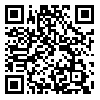Fri, Feb 20, 2026
[Archive]
Volume 18, Issue 2 (9-2004)
Med J Islam Repub Iran 2004 |
Back to browse issues page
Download citation:
BibTeX | RIS | EndNote | Medlars | ProCite | Reference Manager | RefWorks
Send citation to:



BibTeX | RIS | EndNote | Medlars | ProCite | Reference Manager | RefWorks
Send citation to:
HADJZADEH M, ABDOL LAHIAN E, SARGOLZAIE M, MOHEBBY M. EFFECTS OF DESMOPRESSIN ON MEMORY DISORDERS DUE TO ELECTROCONVULSIVE THERAPY (ECT) IN HUMANS . Med J Islam Repub Iran 2004; 18 (2) :111-117
URL: http://mjiri.iums.ac.ir/article-1-627-en.html
URL: http://mjiri.iums.ac.ir/article-1-627-en.html
From the Department of Physiology and Avicel1l1a Psychiatric Hospital. Mashhad University of Medical Sciences, Mashhad, Iran.
Abstract: (5527 Views)
Electroconvulsive therapy (ECT) is an efficient treatment for several neuropsychiatric
disorders however a large number of patients develop memory impairment after
ECT. Different studies both on animals and human suggest that vasopressin has positive
effects on memory and improves cognitive functions. In this randomized, double-blind
controlled clinical trial, 50 patients with psychiatric disorders who were candidate for
ECT were studied. In the control group (20 patients) who received normal saline, ECT
resulted in impairment in several aspects of memory such as: immediate memory, short
tenn memory, visual memory, associate learning and memory quality. The sub-scores
for most of the sub-fractional aspects of memory by WMS tests were decreased significantly
by the 2nd and the 3rd tests (p<0.00 I for most of the measured parameters).
In the case group (30 patients), each patient received 60 Mg/day (in 3 doses)
desmopressin as intranasal spray during the ECT treatment most of the measured
parameters were increased significantly by the 2nd and the 3rd WMS tests. There
were significant differences between the two groups for most memory scores
(p<0.000 I). The data demonstrate that desmopressin has protective and facilitating
effects on memory impairment after ECT. Therefore, we conclude that desmopressin
may be effective in the prevention of memory disorders by facilitating effects on memory
and learning processes and may be used in patients who receive ECT for neuropsychiatric
disorders.
Type of Study: Original Research: Clinical Science |
Subject:
Physiology
| Rights and permissions | |
 |
This work is licensed under a Creative Commons Attribution-NonCommercial 4.0 International License. |





